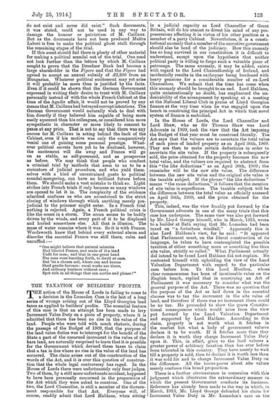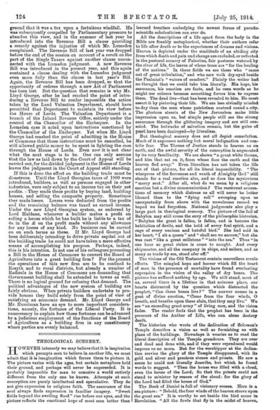THE TAXATION OF BUILDERS' PROFITS. T HE action of the House
of Lords in failing to come to a decision in the Lumsden Case is the last of a long series of wrongs arising out of the Lloyd Georgian land taxes as applied to builders' profits. The essential feature of this case is that an attempt has been made to levy Increment Value Duty on a piece of property, where it is admitted that there has been no rise in the value of the land. People who were told with much rhetoric, during the passage of the Budget of 1909, that the purpose of the land value duties was to intercept for the benefit of the State a part of the unearned increment in the value of the bare land, are naturally surprised to learn that it is possible for the Government which devised these taxes to claim that a tax is due where no rise in the value of the land has occurred. The claim arises out of the construction of the words of the Act, and it is over this question of construc- tion that the whole legal controversy has raged. In the House of Lords there were unfortunately only four judges. Two of them, by a still more unfortunate accident, happened to have been personally concerned in the preparation of the Act which they were asked to construe. One of the two, the Lord Chancellor, is still a member of the Govern- ment responsible for that Act. Everyone will, of course, readily admit that Lord Haldane, when sitting in a judicial capacity as Lord Chancellor of Great Britain, will do his utmost to divest his mind of any pre- possessions affecting it in virtue of his other position as a member of a party Cabinet. Nevertheless, it is a consti- tutional anomaly that a member of the executive government should also be head of the judiciary. How this anomaly has so long survived in our constitution it is difficult to understand, except upon the hypothesis that neither political party is willing to forgo such a valuable piece of patronage. The same anomaly, it may be added, exists with regard to the Lord Chancellorship of Ireland, and incidentally results in the exchequer being burdened with heavy pensions for a considerable number of ex-Lord Chancellors. We submit that the time has come when this anomaly should be brought to an end. Lord Haldane, quite unintentionally no doubt, has emphasized the un- desirability of the arrangement by speaking at a meeting at the National Liberal Club in praise of Lloyd Georgian finance at the very time when he was engaged upon the bench in construing the principal Act in which that novel system of finance is embodied.
In the House of Lords, the Lord Chancellor and Lord Shaw, who as Sir Thomas Shaw was Lord Advocate in 1909, took the view that the Act imposing the Budget of that year must be construed literally. The Act says that the valuers are to ascertain the total value of each piece of landed property as on April 30th, 1909. They are then to make certain deductions in order to ascertain the site value. If the property is subsequently sold, the price obtained for the property becomes the new total value, and the valuers are required to abstract from this "the like deductions" as on April 30th, 1909; the remainder will be the new site value. The difference between the new site value and the original site value is the taxable subject. If the phrase" the like deductions" means "the same deductions," it follows that the mention of site value is superfluous. The taxable subject will be the difference between the total value as officially assessed on April 30th, 1909, and the price obtained for the property. This, indeed, was the view frankly put forward by the Government advocate in one of the many trials that this case has undergone. The same view was also put forward by Mr. Lloyd George himself, who in March, 1913, wrote to a builder at Bath saying that Mr. Lumsden had been taxed on "a fortuitous windfall." Apparently this is also Lord Haldane's view, for he said : "It appeared that Parliament must, on the literal construction of its language, be taken to have contemplated the possible taxation of either something more or something less than site value, strictly so called." What Parliament actually did intend to be taxed Lord Haldane did not explain. He contented himself with upholding the view of the Land Valuation Department with regard to the particular case before him. To this Lord Moulton, whose clear commonsense has been of inestimable value on the English bench, replied that in construing an Act of Parliament it was necessary to consider what was the general purpose of the Act. There was no question that the purpose of the Act as laid down in the essential clauses was to tax the increment in the site value of land, and therefore if there was no increment there could be no tax. He proceeded to show the grave Constitu- tional consequences which would arise from the view put forward by the Land Valuation Department and supported by Lord Haldane. According to this claim, property is not worth what it fetches in the market but what a body of government valuers declare it to be worth. If it fetches more than they declare it is worth they charge Increment Value Duty upon it. This, in effect, gives to the land valuers a greater power of arbitrary taxation than has ever before been tolerated in this country. They have merely to wait till a property is sold, then to declare it is worth less than it was sold for and to charge Increment Value Duty on the difference. All the hocus-pocus about site values merely confuses this broad proposition.
There is a further circumstance in connexion with this judgment which illustrates the extraordinary manner in which the present Government conducts its business. Reference has already been made to the way in which, in March, 1913, Mr. Lloyd George defended his claim for Increment Value Duty in Mr. Lumsden's case on the ground that it was a tax upon a fortuitous windfall. He was subsequently compelled by Parliamentary pressure to abandon this view, and in the summer of last year he introduced into the Revenue Bill a clause providing a remedy against the injustice of which Mr. Lumsden complained. The Revenue Bill of last year was dropped before the end of the session on account of a revolt on the part of the Single Taxers against another clause uncon- nected with the Lumsden judgment. A new Revenue Bill was introduced in the present year, and this again contained a clause dealing with the Lumsden judgment even more fully than the clause in last year's Bill. Again, the Revenue Bill has been dropped, so that the opportunity of redress through a new Act of Parliament has been lost. But the question that remains is why Mr. Lloyd George, after he had reached the point of intro- ducing a Revenue Bill to render impossible the action taken by the Land Valuation Department, should have permitted that Department to maintain its view before the House of Lords. The Valuation Department is a branch of the Inland Revenue Office, entirely under the control of the Chancellor of the Exchequer. In the Lumscleu case it acted upon instructions sanctioned by the Chancellor of the Exchequer. Yet when Mr. Lloyd George had reached the point of admitting in the House of Commons that those instructions must be cancelled, he still allowed public money to be spent in fighting the case through the House of Lords. Even now it is not clear what the next stage is to be. One can only assume that the law as laid down by the Court of Appeal will be carried out, for the divided judgment in the House of Lords leaves the judgment in the Court of Appeal still standing.
If this is done the effect on the building trade must be disastrous. Until the Lloyd Georgian taxes of 1909 were introduced, builders, as well as persons engaged in other industries, were only subject to an income tax on their net profits. • They made these profits by buying land, building houses, and selling the composite property. Sometimes they made losses. Losses were deducted from the profits and the remaining balance was taxed as earned income. Under the new Lloyd Georgian system, as endorsed by Lord Haldane, whenever a builder makes a profit on selling a house which he has built he is liable to a tax of 4s. in the .2 on the profit made without any allowance for any losses of any kind. No business can be carried on on such terms as these. If Mr. Lloyd George had been deliberately intending to drive private capital out of the building trade he could not have taken a more effective means of accomplishing his purpose. Perhaps, indeed, this is his intention. Is not one of his colleagues promoting a Bill in the House of Commons to convert the Board of Agriculture into a great building firm ? For the present the operations of this new firm are to be confined to Rosyth and to rural districts, but already a number of Radicals in the House of Commons are demanding that Government building shall be extended to towns as well. There is no logical ground for refusing that demand. The political advantages of the new system of building are fairly obvious. When private builders undertake to pro- vide houses they build solely from the point of view of satisfying an economic demand. Mr. Lloyd George and Mr. Runciman have an eye to more important considera- tions, namely, the fortunes of the Liberal Party. It is unnecessary to explain how those fortunes can be advanced by a judicious employment of the functions of the Board of Agriculture as a building firm in any constituency where parties are evenly balanced.







































 Previous page
Previous page